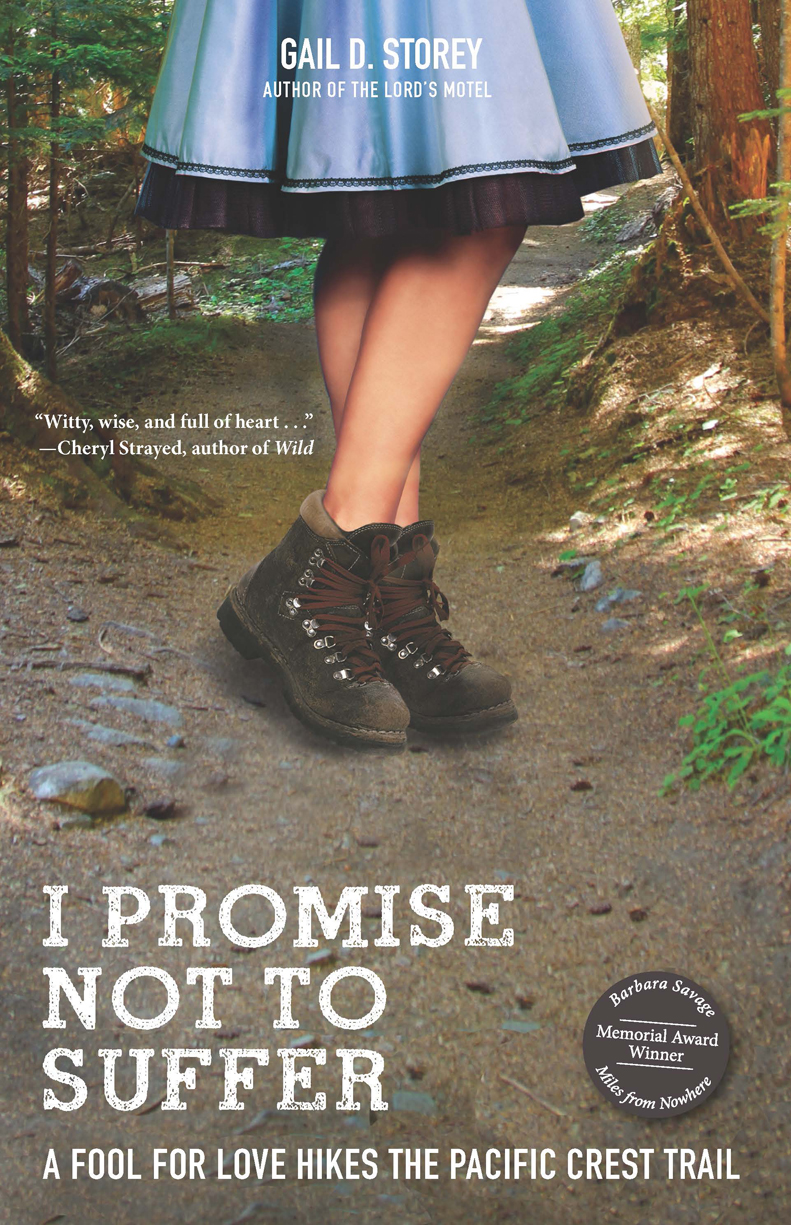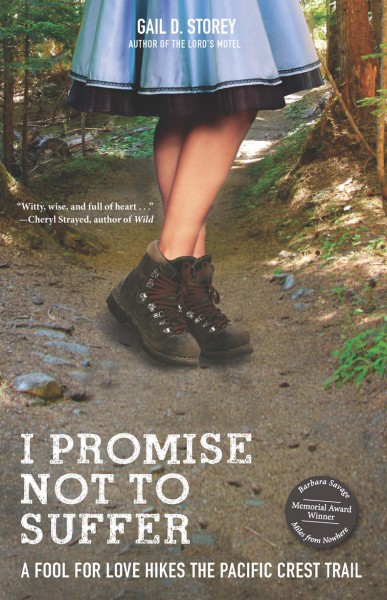
22 Jul Between the Covers: Award-winning Author Gail Storey in Town
Gail D. Storey is the author of “I Promise Not to Suffer: A Fool for Love Hikes the Pacific Crest Trail,” winner of the National Outdoor Book Award, Foreword IndieFab Book of the Year Award, Colorado Book Award, Nautilus Silver Award, and Barbara Savage Award from Mountaineers Books. The book received early, full-throated praise by Cheryl Strayed, author of “Wild”:
Witty, wise, and full of heart, Gail Storey’s winning memoir of her hike on the Pacific Crest Trail at the age of fifty-six is a book for every one who ever dreamed of taking the road less traveled. ‘I Promise Not to Suffer’ is as inspiring as it is hilarious, as poignant as it is smart. It’s one of those oh-please-don’t-let-it-end books. I’d carry it in my backpack anywhere.”
Liz Bergeron, Executive Director and CEO, Pacific Crest Trail Association adds:
Of the many books that I have read about hiking the Pacific Crest Trail, none have captured the trail experience from so many different perspectives. Single hikers, couples, and those who stay behind will all enjoy Gail Storey’s account of the challenges, the beauty, and the PCT community found along the way.”
Gail Storey is no newcomer to the trade. She is a successful writer of fiction and poetry and a frequent writing instructor. Her first novel, “The Lord’s Motel,” was praised by the New York Times Book Review as “a tale of unwise judgments and wise humor.” Her second novel, “God’s Country Club,” was a Barnes & Noble Discover Great New Writers Selection. She has won numerous other awards, and her fiction, poetry, and essays have been widely published. A former administrative director of the University of Houston Creative Writing Program, Gail now writes, hoop-dances, and jumps out of cakes, not necessarily at the same time. She is also notorious for her “sins of humor.”
But Gail Storey was not a hiker. Still, when husband Porter resigned from his longtime job as the director of a hospice center in Texas to hike the 2,663-mile Pacific Crest Trail from Mexico to Canada, she refused to let him go alone—even though the prospect of leaving their comfortable Houston careers, hiking up to 20 miles a day while popping anti-depressants and hormones, and sleeping outside for six months terrified her.
Carrying Porter’s handmade ultralight equipment, they sizzle in the Mojave Desert, nearly drown fording a swollen river, wade through High Sierra snows, and stumble through the lava fields of Oregon. With every step and switchback, as the trials of the trail test and deepen their relationship, Gail and Porter each walk into the question “who am I?” Gail, confronting dangerous weight loss and her mother’s prolonged illness back home, feels herself irrevocably changed by life on the trail. She faces down a mountain lion and fierce alpine storms, alternately frightened by nature’s power and inspired by its profound force—finding a wisdom that three master’s degrees and a life in the city never taught her.
Humorous yet honest, “I Promise Not to Suffer: A Fool for Love Hikes the Pacific Crest Trail” shares a journey about love and the human spirit.
“Some have called Gail Storey the Nora Ephron of the wilderness. With her own unique wit, Storey shares Ephron’s commitment to creating and tending a long, nourishing marriage. ‘I Promise Not to Suffer’ is a portrait of a union that does not fray or break under pressure but is forged, toughened, and tenderized,” adds Sara Davidson, author of “Leap!,” “Loose Change”, and “The December Project.”
Gail Storey is in town for a reading, followed by a Q &A and book-signing on Sunday, July 27, at Arroyo Wine Bar.
I Promise Not to Suffer” is available at Between the Covers Bookstore.
For a preview of what’s in store when you buy the book, watch this video:
http://www.youtube.com/user/GailStorey
And the following is an extended (hilarious, poignant) interview with Storey reprinted from Zone 3 Press:
Amy Wright: What, Gail Storey, have you not done?
Gail Storey: I haven’t yet mastered split-timing twin-hooping on- and off-body in my hoopdance class, but hope to in time for our annual summer party when I jump out of my birthday cake for 200 of our closest friends. You can check my YouTube channel at Gail Storey if you want to see me lose what reputation I have left.
AW: Your mother, you say in an early chapter of I Promise Not To Suffer: A Fool for Love Hikes the Pacific Crest Trail, “Postpones Dying” while you set off for months of trekking. Meaningfully, she waits long enough that you, and you alone at that, are able to join her at her bedside, providing a memory that I am sure you will value for the rest of your life. Many people shy away from even talking about moments of death, let alone appreciating direct encounters. Will you elaborate on that experience?
GS: My relationship with my mother was complex, in that I felt I betrayed her values, particularly her sexual values, while struggling to find my place in the world. The untangling of my misunderstandings about her is a thread of I Promise Not to Suffer. Hiking the Pacific Crest Trail gave me the space and comfort of nature as primal Mother, and opened my heart to my love for my mother, and hers for me, during her dying. You’re right that I’ll treasure that for the rest of my life. Since marrying Porter, a hospice and palliative care physician, I’ve come to see how dying can be an exquisitely meaningful part of life. I’m grateful for the glimpse into the luminous Silence that my mother fell back into.
AW: Are you equally proud of all of your writing, or do you have a fondness for particular pieces— due to the difficulty of their revelations or some other quality?
GS: I get a huge kick out of my first lines: “Is it better to have fun with a kinky man or to be gloomy with a good one?” for my first novel, The Lord’s Motel, and “Gabriel’s condo complex is called God’s Country Club, but the landscape service went belly-up and only the cacti survive,” for my second novel, God’s Country Club. And the first line of I Promise Not to Suffer: “I never much cared for nature, or rather, thought it okay as long as it stayed outside.”
AW: The confession that you “never much cared for nature,” is unexpected in a memoir devoted to hiking. It also surprised me, who met you in Boulder, Colorado, looking every bit as fit and outdoorsy as the rest of that population. Will you talk about how that relationship has evolved over time?
GS: A crisis in Porter’s career as a hospice physician precipitated his longing to bicycle across the country and hike first the 2,180-mile Appalachian Trail and then the 2,663-mile Pacific Crest Trail. As I ask in the book, while he was doing that, I’d be doing what? With the same baffling inevitability with which I said yes to his marriage proposal, I agreed to bike on a tandem with him from Texas to Maine, hike as much as I could of the Appalachian Trail, bike on our tandem from Texas to California, and hike the Pacific Crest Trail. Biking or hiking up and down in the wind, blazing sun, rain, even snow, all day, every day for months at a time erodes the permeable layer between self and nature. We moved to Boulder where hiking and biking are organic parts of our everyday lives. We live by green values in our house remodeled for solar and photovoltaic energy. Each day I feel more intimately how we’re one with nature.
AW: What is the best writing advice you’ve ever gotten—directly or indirectly?
GS: Grace Paley read some of my early writing, and said “You’re okay, kid, even when you’re foolin’ around.” I took that as reassurance that my full writer could show up in all her extremes from the sexual to the spiritual, the serious to the outrageously comic.
AW: You mention making lists in this memoir, and the index is filled with food items and gear. Porter teases you about your list-making, seeing perhaps how we all seek order when confronting some unknown. Do you have a favorite list, or books of lists—that is, do you like reading lists, or is it more a function of putting your mind at ease to write them?
GS: It’s totally a way of freeing up my mind’s screenspace by relegating to-do’s for later download. I love the act of making a list and crossing off items, like a found poem in the writing and revision. Handwritten lists are the most fun, although I do have computerized ones I print out for grocery shopping, birthdays, holiday gifts, all sorts of things. At my most neurotic, I kept a list of our dinner parties, who came, and what we served them, so no one would ever have to eat the same thing twice. I gave that up, though; people are thrilled to get your signature pasta puttanesca when their turn comes ’round again.
AW: You describe yourself wearing a black boa and fuchsia leopard leggings at your bachelorette party before coyly asking a friend, “Don’t I look like a doctor’s wife?” Are such outfits a reflection of your sense of humor, or an ability to not take yourself too seriously, or how much absurdity is inherent in the human experience?
GS: When I taught inner-city kids for Writers in the Schools, a second-grader once wrote that she liked my “sins of humor.” I love to laugh, and I have more costumes than regular clothes in my closet. I try to be a good steward of my life, I take the privilege of the human experience quite seriously, but I don’t take the small, conditioned self all that seriously. It still thinks it’s a separate self apart from the vastness of Awareness, for cryin’ out loud! So my “sins of humor” are a way of saying to that small self, it’s okay, honey, just relax in the deep “Don’t Know.”
AW: You ask in the memoir if anyone can understand the “give-and-take of someone else’s marriage,” going on to say that yours was “founded, in part, on relief at being delivered from previous painful relationships” and that “evolved into a deep desire to take care of each other.” It sounds paradoxical, but it takes a strong sense of self to undertake care for another. How did you earn that trust in yourself?
GS: I’m not at all sure that I earned that trust in myself; it’s more that I hope I cooperated, and continue to, with the flow of life. Some call that grace. Terrible and beautiful things have happened to me. Whenever I wring my hands over past ignorance, Porter reminds me “You had to go through everything you did to be who you are today.” And who is that? I love that I’m being taken up increasingly inside the question. The deeper I open to the question “Who are we?” the more trust and love I feel for Porter, myself, other people, our soulful planet, and Life itself.




Sorry, the comment form is closed at this time.